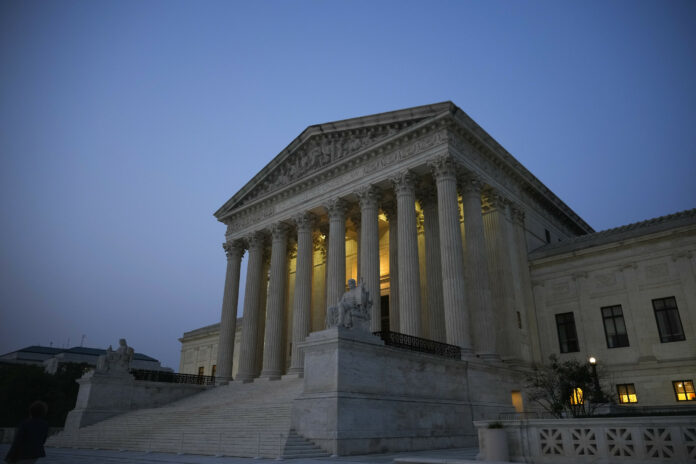The Supreme Court has ruled that a Texas rancher can sue the state for flood damage to his property, in a decision that advocates say will boost property rights.
Richie DeVillier sued Texas in state court in 2020 after his land repeatedly flooded due to changes that Texas made to nearby Interstate 10. He argued that he had the right to damages under both state law and the Fifth Amendment, which prohibits private property being taken for public use without just compensation.
Texas moved the case to federal court, where lawyers sought to dismiss it by arguing that it was not a Fifth Amendment issue, according to The Texas Tribune.
Drew Angerer/Getty Images
Justices heard oral arguments in January on whether DeVillier should receive federal relief and if the case should be heard by a federal or state court. Texas Solicitor General Aaron Lloyd Nielson said the state would accept the case if it was updated to only reflect state law.
In an unanimous opinion, issued on Tuesday, Justice Clarence Thomas wrote that the concession was enough to resolve the case.
“Although Texas asserted that proceeding under the state-law cause of action would require an amendment to the complaint, it also assured the Court that it would not oppose any attempt by DeVillier and the other petitioners to seek one,” Thomas wrote.
“This case therefore does not present the circumstance in which a property owner has no cause of action to seek just compensation. On remand, DeVillier and the other property owners should be permitted to pursue their claims under the Takings Clause through the cause of action available under Texas law.”
DeVillier’s case is representative of about 120 other property owners who say the construction of a makeshift barrier on Interstate 10 worsened flooding in the area during Hurricane Harvey, causing damage to their property.
“Texas can now be held accountable under the Fifth Amendment,” DeVillier said in a statement after the ruling. “This is the pinnacle of a long, hard-fought battle, and we can’t stress enough what a blessing this is.”
Robert McNamara, a senior attorney with the Institute for Justice, which represented DeVillier, said in a statement that “lower courts had held that landowners like Richie were powerless to compel states like Texas to obey the Constitution. [Tuesday’s] ruling makes clear that property owners have more power than Texas thought.”
McNamara also blasted Texas Attorney General Ken Paxton for claiming victory in the case.
“We secured a unanimous 9-0 win at the U.S. Supreme Court in a case protecting the ability of Texas to handle compensation disputes under State law for any allegedly taken property,” Paxton wrote in a post on X, formerly Twitter. “For as long as Texas has been Texas, it has recognized that property rights are crucial to a free society. Under the U.S. Constitution, such claims should be pursued under state law unless Congress has said otherwise.”
McNamara said the Supreme Court’s ruling makes clear that Texas “can be sued under the Fifth Amendment and that the claims Texas wanted thrown out will instead go to trial in that same federal district court—in other words, after Texas spent untold amounts of time and taxpayer dollars trying to get Richie’s Fifth Amendment claims dismissed, Richie will get to litigate his Fifth Amendment claims.
“The party that gets what he wants is the party that won. What Texas did is called losing. Only a politician would claim to have won a case he lost.”
Uncommon Knowledge
Newsweek is committed to challenging conventional wisdom and finding connections in the search for common ground.
Newsweek is committed to challenging conventional wisdom and finding connections in the search for common ground.


